Kinross Gold
 | |
| Public | |
| Traded as | TSX: K NYSE: KGC |
| Industry | Metals and Mining |
| Founded | 1993 |
| Founder | Robert Buchan |
| Headquarters | Toronto, Canada |
Key people | J. Paul Rollinson, President and CEO[1] |
| Products | Gold, Silver |
| Revenue | $3.5 billion (2015)[2] |
| Website | www.kinross.com |
Kinross Gold Corporation is a Canadian-based gold and silver mining company founded in 1993 and headquartered in Toronto, Canada. Kinross, through a series of transactions now operates nine active gold mines, being 2015's fifth largest gold producer in the world. That year, Kinross produced 2.59 million ounces of gold. The company's activities are mainly carried out in Brazil, Chile, Ghana, Mauritania, Russia and the United States, formerly owning operations in Canada. It trades under the KGC ticker in the New York Stock Exchange and under K in the Toronto Stock Exchange.
History
Founding and early years
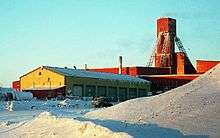
Kinross Gold Corporation was founded in 1993 following the amalgamation of three companies: Plexus Resources Corporation, CMP Resources and the numbered company 1021105 Ontario Corp. This resulted in the new company owning a stake and royalties on a mining property in Fallon, Nevada and the QR Mine in British Columbia.[3] Kinross was listed on June 1, 1993 on the Toronto Stock Exchange and NASDAQ, and on the New York Stock Exchange the following year.[2]
Kinross' first project, now operated by its subsidiary Fairbanks Gold Mining, was the Fort Knox Gold Mine operating as an open pit in Alaska. The area, including its surroundings deposits, was prospected as early as 1913, but no mining took place until 1996. In 1998 the owner of Fort Knox (Amax Gold) merged with Kinross.[4][5]
In 1998, Kinross merged with Amax Gold (formerly known as Kinam Gold),[6] which gave Kinross the Fort Knox Gold Mine.[4] In 2000, Kinross amalgamated with LT Acquisition Inc.[7]
1999 – 2006
In 2002, Kinross and Placer Dome combined their assets in Timmins, Ontario and formed the Porcupine Joint Venture (51% Placer Dome, 49% Kinross).[8] Also in 2002, Kinross TVX Gold, and Echo Bay Mines proposed a $3-billion merger, which would combine the three companies, while retaining the name Kinross Gold. The merger was delayed from its original closing due to Kinross' inability to raise the necessary funds,[9] but was approved by shareholders in January 2003.[10] The TVX merger resulted in Kinross' stake in the La Coipa open pit mine, the remainder being purchased from Goldcorp in 2007.
Kinross took control of the Lupin mine in Nunavut Territory, Canada, in 2003. In 2006, Kinross sold the Lupin Mine and the Blanket Mine located in Zimbabwe, completing the sale in 2007. By 2013, the Lupin mine was inactive.[11][12]
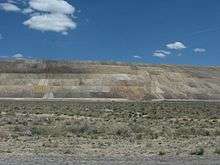
The acquisition of Rio Paracatu Mineração followed in 2004. In 2005, Kinross sold the Aquarius Project (acquired as part of the Echo Bay merger[13]) to St. Andrews Goldfields (who operated the nearby Stock Gold Mine).[14][15][16]
In 2006, Kinross bought Crown Resources Corporation, which gave them ownership of the mineral resource Buckhorn Mountain (later Buckhorn Gold Mine) and the associated mineral processing facilities.[17][18][19] That year saw the sale of Kinross' Blanket mine in Zimbabwe to Caledonia Mining Corporation. Kinross had never operated the mine given it was written down in 2002.[20][21]
Kinross first acquired 50% ownership in the Maricunga Gold Mine property with the merger with Amax Gold (which changed its name to Kinam).[22] The 2007 purchase of Bema Gold brought the other 50%, being now owned by Compañía Minera Maricunga (CMM).[23] Production re-started in October 2005.[24]
2007 – present
In 2007, Kinross traded assets with Goldcorp; Kinross received $200-million and the remaining portion of the La Coipa Gold Mine it had acquired with the TVX merger, in exchange for giving up its 49% of the Porcupine Joint Venture and 31.9% of the Musselwhite mine.[25] In September 2008, Kinross acquired 100% of the outstanding shares of Aurelian Resources Inc. for a total of $809 million,[26][27] effectively acquiring 100% of the Fruta del Norte and Condor Ecuadorian deposits.[27][28] Kinross described Fruta del Norte as one of the most "significant gold discoveries in the last 15 years".[29] On June 20, 2013, Kinross announced it would not proceed with further development of the Fruta del Norte project,[30] and in October 2014 sold its interest for $233 million.[31][32]
Another of Kinross' Chilean properties is the Cerro Casale mine.[27] Kinross acquired Cerro Casale in 2007 as part of the acquisition of Bema Gold Corporation.[33] In 2010, Kinross sold a 25% interest in Cerro Casale's copper deposit to Barrick Gold for $474 million.[34] Kinross currently owns a 25% interest and Barrick owns the remaining 75%, the project itself being owned by Compañía Minera Casale.[35] The project is inactive as of 2015.[36]
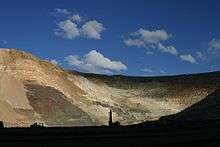
In 2008, Kinross acquired a 40% interest in Lobo-Marte, located in Chile, from Anglo American plc for $141 million.[37] In early 2009, Kinross acquired the remaining interest for $41 million, via its daughter company CMM.[38] As at December 31, 2013, Kinross reported the property contained 6.0 million ounces of probable gold reserves. In 2014, the reserves were reclassified from "probable" to "measure & indicated".[31] As of December 31, 2015, Kinross reported that Lobo-Marte was a "significant" development property, although only prefeasibility studies have been performed on the site.[39]
In 2010, Kinross purchased 91% of Red Back Mining for $7.1-billion.[40] The purchase brought with it the two gold mines in Africa (Chirano and Tasiast).[41] Also this year, Kinross acquired the Dvoinoye deposit and the property in Vodorazdelnaya, about 90 kilometres (56 mi) north of Kinross’ Kupol operation; and sold 25% of its interest in the Cerro Casale project in Chile to Barrick. The following year, Kinross entered into a share purchase agreement with the State Unitary Enterprise of the Chukotka Autonomous Okrug, whereby it therefore held 100% of the Kupol mine and exploration licenses. Kinross sold its interest in the Crixás mine to AngloGold Ashanti in 2012.[42][43]
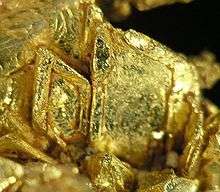
A putative securities class action complaint was filed against the company in 2012 by Bo Young Cha in the United States District Court for the Southern District of New York, alleging Kinross inflated its own share price by making misrepresentations concerning its acquisition of Red Back and its development of the Tasiast mine. The claims were settled in court, without acknowledgement of guilt. A similar claim was made in the Ontario Superior Court of Justice that same year, and was settled in 2015.[44][45][46]
The Crixás mine is located in Brazil. In 2012, Kinross sold its 50% interest in Crixás to AngloGold Ashanti for $220 million.[47] The Corporation announced its halting of development at Fruta del Norte and La Coipa in 2013, as well as the sale of its interest in Aurelian Resources Inc. the following year. It also withdrew its permit application for the Lobo-Marte mine.[48]
On November 2015, Kinross announced it would finalize its purchase of the Bald Mountain mine, its associated land, as well as the remaining 50% of the Round Mountain mine from Barrick.[49] As of December 31, 2015, Kinross reported its White Gold project was a pre-development property.[50][51]
In 2013 the company's silver production was 9 million ounces, making the company the 18th largest silver producer in the world at the time.[52] Kinross' proven and probable gold reserves were 33.2 million ounces as at December 31, 2015. This total includes reserves from inactive mines, Cerro Casale (5.8 million ounces) and Maricunga (1.0 million ounces).[53] In 2015, Kinross produced 2.59 million ounces of gold.[54] Kinross was listed as fifth largest gold producer worldwide in 2015.[55][56]
Operations
Americas
Kinross Gold operates mining projects in North and South America, Russia, and Africa. Its Fort Knox gold mine property counts with a mill, tailings storage, heap leach facility, the Gil project, and the True North open pit mine, which is closed and under monitoring.[57][4] In 2015 the mine produced about 401,500 gold equivalent ounces of gold.[5][2]
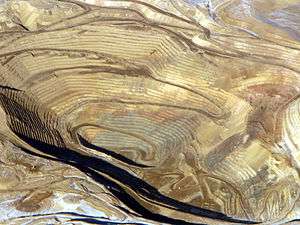
Kinross operates the Buckhorn mine and Kettle River mill in the US State of Washington, following its acquisition of Crown Resources Corporation in 2006. This subsidiary operates the Buckhorn mine, while Echo Bay Minerals operates the Kettle River mill. The mine produces about 97,000 gold equivalent ounces.[58]
Kinross also operates the Round Mountain Gold Mine in Nye County, Nevada since 2003. Round Mountain was a joint venture between Round Mountain Gold Corporation (a Kinross subsidiary) and Barrick Gold. Kinross' merger with Echo Bay Mines gave them a 50% share of Round Mountain, with Barrick retaining the remainder.[59] In 2016 Kinross purchased Barrick's 50% interest. Round Mountain is located in an area where mining has taken place since 1906, having produced 350,000 ounces of gold over a sixty-year period. Its production volume was approximately 197,000 gold equivalent ounces for 2015.[60] As of 2011 the mine was undergoing expansion to increase the size of the pit and related infrastructure.[61][62] Near the Round Mountain mine, Kinross operates a smaller open-pit mine, the Gold Hill mine.[63]
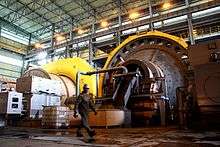
Another Kinross investment, La Coipa gold mine is located in Chile. In October 2013, however, the mine and plant were suspended and the mine is undergoing further exploration.[64][65] In August 2016, Kinross suspended operations at other Chilean mine, the Maricunga gold mine, resulting in a layoff of 300 employees.[66] The decision to close the mine was the result of the Chilean government "shut[ing] down the water system linked to the operation over environmental concerns."[67] The company has pending appeals with Chile's Environmental Tribunal.[68][69] The book value of Maricunga was $373 million as at December 31, 2015, producing approximately 212,000 gold equivalent ounces for the same year.[70][71]
In Brazil, Kinross owns the open-pit Paracatu gold mine, located in northwest Minas Gerais. It includes two process plants, two tailings facilities, as well as accompanying infrastructure. On January 31, 2003, Kinross acquired a 49% ownership interest as part of the acquisition of TVX Gold. On December 31, 2004, Kinross acquired the remaining 51% from Rio Tinto for $255 million,[72] and operated the mine as Kinross Brasil Mineração S.A. This mine is the region's largest employer.[73] In 2015, Paracatu produced 477,662 gold equivalent ounces.[74]
In January 2016, Kinross acquired 100% of the Bald Mountain gold mine and the remaining 50% of the Round Mountain gold mine from an affiliate of Barrick Gold Corporation for $610 million in cash.[75] Bald Mountain is operated by subsidiary KG Mining (Bald Mountain) Inc.[76] Its 2015 production amounted to about 160,000 gold equivalent ounces.[77] The US Bureau of Land Management has authorized the Corporation to increase its exploration activities.[78]
West Africa
The Red Back Mining purchase gave Kinross a 90% stake in the Chirano Gold Mine, while the remainder is held by the Government of Ghana. The mine produced nearly a quarter million ounces of gold in 2011.[41] The mine is made up of three open pits and two underground operations.[79][23]
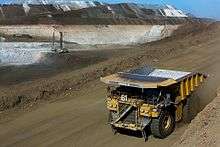
Red Back Mining began production at Tasiast in 2008 in Mauritania. In September 2010, Kinross acquired Tasiast with its Red Back purchase.[80] The property includes an open-pit gold mine with a combined carbon-in-leach and dump leach operation, as well as an adsorption-desorption recovery plant that produces doré.[81] Kinross described a proposed expansion project to increase throughput from 8,000 tonnes per day to 60,000 tonnes per day, which was never put in place. In early 2014, a feasibility study for an expanded Tasiast operation with a 38,000 tonne per day (tpd) mill was completed.[82] On March 30, 2016, Kinross announced it was proceeding with the Tasiast expansion. The expansion is expected to increase processing from 8,000 tonnes per day to 12,000 tonnes per day,[83] and then 30,000 once a second phase is complete.[84] In June that year, due to "government allegations of invalid work permits" for expatriate employees, the mine suspended operations, resuming them in August that same year. As of 2015, its annual production amounted to about 212,000 gold equivalent ounces.[85][86][87]
Russia
In Russia, Kinross possesses the Kupol and Dvoinoye gold mines, located approximately 100 kilometres (60 mi) apart. Kupol/Dvoinoye is Kinross' most profitable operating segment. During the first six months of 2016, its operating earnings were $180 million.[88]

The Kupol Gold Mine is a combination open-pit and underground gold mine in Chukotka Autonomous Okrug, in an area originally mined in the 1930s by prisoners of the Gulag.[89] Bema Gold Corporation financed the $425-million project through various international banks, agencies, and equipment companies, plus the Chukotka government. Kinross acquired the property (at the time 75% of the mine) through the acquisition of Bema Gold, and a subsidiary (Chukotka Mining & Geological Company) purchased the remaining 25% from the government (via the State Unitary Enterprise of the Chukotka Autonomous Okrug) in 2011.[90][91][92] Kinross expects to commence mining at Moroshka in 2018 and will have its ore processed in the Kupol mill.[93] Moroshka is located approximately four kilometers east of Kupol and within the Kupol license area.[94][95]
The Dvoinoye underground gold mine was acquired in 2010 through Northern Gold LLC and Ragionruda LLC, and opened in 2013. Ore from the mine is processed at Kupol. Gold production at both mined equated a total of approximately 758,000 gold equivalent ounces for 2015.[96] The grade of reserves at Dvoinoye, 11.2 g/tonne, is significantly higher than Kinross' other mines. In contrast, the grade at Paracatu is only 0.4 g/tonne and the grade at Tasiast is 1.9 g/tonne. The September Northeast project near Dvoinoye is expected to begin mining in early 2017.[2][97]
At Kupol, gold and silver occur as native gold, gold-silver alloy electrum, acanthite as well as silver-rich sulfosalts.[98] Dvoinoye, on the other hand is a low sulfidation epithermal gold-silver vein deposit, and notably counts with appreciable free gold in parts of the deposit. Ore minerals and sulfides in the vein include freibergite, pyrite, chalcopyrite, galena, and sphalerite.[99]
Corporate responsibility
Kinross asserts a strong commitment to responsible mining, as outlined on its corporate website via their Ten Guiding Principles for Corporate Responsibility.[100] In 2015, Kinross achieved an A− ranking in Maclean's magazine's annual assessment of socially responsible companies, the highest ranking of any Canadian mining company.[101][102]
For Kinross' cooperation with an environmental group in Washington state, and for five out of eight mines being in compliance with the International Cyanide Management Code (as of May 2013, the Company had eight of its nine mines in compliance with the International Cyanide Management Code),[103] Kinross was recognized as one of Canada's Top 50 Most Responsible Corporations by Maclean's magazine and Jantzi Research in 2009.[104][105]
Through a $1 million donation by Kinross in 2010, the University of Guelph created a new chair as part of its BetterPlanet Project. Said Chair is named the Kinross Chair in Environmental Governance, and is held by a "succession of experts".[106] Also with the university, Kinross provided $100 thousand towards its Fight Against Hunger.[107][108]
In 2010, Kinross committed to contribute $10 million over a three-year period towards developing a mining school in Mauritania. The following year, it committed $2.5 million to build and equip a medical emergency centre in that country.[109][110]
In 2013, Kinross was named to the Dow Jones Sustainability World Index for the third consecutive year, as well as the DJSI North American Index, the Ethibel Excellence Investment Register, and the Ethical Global Equity and ECPI Global Carbon Indices. For the fifth consecutive year, the Company was named to the Jantzi Social Index, and as one of Canada’s Best 50 Corporate Citizens by Corporate Knights magazine for the fourth year.[111]
See also
References
- ↑ Jamasmie, Cecilia. "Kinross Gold's CFO leaves, two months after CEO replaced". Mining. Mining. Retrieved 23 September 2016.
- 1 2 3 4 Gilroy, Annie. "Must Know: An Overview of Kinross Gold Corp.". Market Realist. Market Realist. Retrieved 23 September 2016.
- ↑ "Shareholders back merger forming Kinross Gold". Deseret News. 31 May 1993. Retrieved 2 September 2011.
- 1 2 3 Scales, Marilyn (June 2003). "How to Get Gold Out of Fort Knox". Canadian Mining Journal. Retrieved 31 August 2011.
- 1 2 "Fort Knox, Alaska, USA". Kinross Gold. Retrieved 27 August 2011.
- ↑ Kinross Gold (23 June 2006). "Walter Creek Valley Fill Heap Leach Facility Project Description" (PDF). Alaska DNR. p. 4. Retrieved 3 September 2011.
- ↑ Canadian Mines Handbook. Southam Mining Group. 2001.
- ↑ Vieira, Paul (12 April 2002). "Placer Dome, Kinross to join forces in Ontario gold operation: Kinross gains mill access". National Post. p. FP7.
- ↑ "COMPANY NEWS Kinross, Echo Bay, TVX Delay Merger". Canadian Mining Journal. 20 November 2002. Retrieved 2 September 2011.
- ↑ CZERNOWALOW, MARTIN. "Newmont increases dividend". Mining Weekly. Mining Weekly. Retrieved 17 September 2016.
- ↑ "Kinross sheds some weight (Jul 3 - 9, 2006 Volume 92 Number 19)". The Northern Miner. The Northern Miner. Retrieved 17 September 2016.
- ↑ "Owner puts Nunavut's Lupin Mine project back into limbo". Nunatsiaq online. Nunatsiaq online. Retrieved 23 September 2016.
- ↑ "Merger improves viability of gold deposit project". Northern Ontario Business. 26 June 2002. Retrieved 2 September 2011.
- ↑ "Kinross To Sell Aquarius Project". thestreet.com. 29 December 2005. Retrieved 2 September 2011.
- ↑ Canadian & American Mines Handbook. Business Information Group. 2006.
- ↑ "Kinross Sells Aquarius Project to St Andrew Goldfields". Kinross Gold. Kinross Gold. Retrieved 17 September 2016.
- ↑ Okanogan and Wenatchee National Forests (N.F.), Buckhorn Access Project: Environmental Impact Statement. 2007. pp. 19–.
- ↑ Leng Yeong, Cheng (4 August 2006). "Kinross Has Record $65.6 Million Profit on Gold Rally (Update4)". Bloomberg. Retrieved 2 September 2011.
- ↑ "Kettle River-Buckhorn, USA". Kinross Gold. Kinross Gold. Retrieved 17 September 2016.
- ↑ SA Mining: South African Mining, Coal, Gold, and Base Minerals. TML Business. May 2006.
- ↑ "Kinross Braces for $11.8 Million Loss". Africa Intelligence. Africa Intelligence. Retrieved 14 October 2016.
- ↑ Commerce Clearing House (1941*). Federal securities law reporter: federal regulation of securities : laws, regulations, forms, rulings and decisions currently supplemented and indexed. Commerce Clearing House. Check date values in:
|date=(help) - 1 2 Gilroy, Annie. "A Look at Kinross Gold's West Africa Operations". Market Realist. Market Realist. Retrieved 24 September 2016.
- ↑ Chilean mining compendium. Editec. 2005.
- ↑ "Analysts see Goldcorp, Kinross asset swap gains". Bloomberg. 26 Sep 2007. Retrieved 2 September 2011.
- ↑ Gavin Hilson (22 April 2016). Natural Resource Extraction and Indigenous Livelihoods: Development Challenges in an Era of Globalization. Routledge. pp. 122–. ISBN 978-1-317-08971-1.
- 1 2 3 Geological Survey (U S ) (17 February 2011). Minerals Yearbook, 2008, V. 1, Metals and Minerals. Government Printing Office. pp. 31–. ISBN 978-1-4113-3015-3.
- ↑ Jamasmie, Cecilia. "Lundin Gold getting closer to developing Fruta del Norte in Ecuador". Mining. Mining. Retrieved 23 September 2016.
- ↑ "GOLD: Kinross sells Fruta del Norte to Fortress". Canadian Mining Journal. Canadian Mining Journal. Retrieved 24 September 2016.
- ↑ Gill, Nathan. "Kinross Reaches Preliminary Agreement for Ecuador Mine". Bloomberg. Bloomberg. Retrieved 23 September 2016.
- 1 2 "Kinross Gold 2014 Annual Report" (PDF). www.Kinross.com. Kinross Gold Corporation. p. FS 23. Retrieved 7 September 2016.
- ↑ Alvaro, Mercedes. "Kinross to Sell Interest in Ecuador's Fruta del Norte Gold Mine to Fortress". Wall Street Journal. Wall Street Journal. Retrieved 23 September 2016.
- ↑ Usa Ibp Usa (November 2009). Chile Mineral & Mining Sector Investment and Business Guide Volume 1 Strategic Information and Regulations. Int'l Business Publications. pp. 63–. ISBN 978-1-4330-0664-7.
- ↑ Russell, Simon. "Exeter Resource Corporation: Big Gold Discovery in Northern Chile". GoldSeek. GoldSeek. Retrieved 25 September 2016.
- ↑ "2015 Kinross Gold Annual Report" (PDF). www.Kinross.com. Kinross Gold Corporation. p. FS 31. Retrieved 9 September 2016.
- ↑ "Estudio para reactivar Cerro Casale finaliza sin éxito y Barrick lo saca de su portafolio". Minería Chilena. Minería Chilena. Retrieved 25 September 2016.
- ↑ "2008 Kinross Gold Annual Report" (PDF). www.Kinross.com. Kinross Gold Corporation. p. 34. Retrieved 9 September 2016.
- ↑ "2009 Kinross Gold Annual Report" (PDF). www.Kinross.com. Kinross Gold Corporation. p. 58. Retrieved 9 September 2016.
- ↑ "2015 Kinross Gold Annual Report" (PDF). www.Kinross.com. Kinross Gold Corporation. p. 27. Retrieved 9 September 2016.
- ↑ The Globe and Mail (29 June 2012). The Lunch. Booktango. pp. 104–. ISBN 978-1-4689-0835-0.
- 1 2 "In Canada, a Merger for Miners of Gold". The New York Times (AP). August 2, 2010. Retrieved August 2, 2010.
- ↑ "Kinross unloads stake in Crixas for US$220 million". Canadian Mining Journal. Canadian Mining Journal. Retrieved 24 September 2016.
- ↑ "Kinross Gold Acquires Red Back Mining for $7.3B". Lexpert. Lexpert. Retrieved 23 September 2016.
- ↑ "ANNUAL INFORMATION FORM" (PDF). Kinross. Kinross. Retrieved 23 September 2016.
- ↑ "Notice of Settlement with Kinross Gold Corporation". Newswire. CNW. Retrieved 23 September 2016.
- ↑ Bigin, Michael S. "Bernstein Liebhard LLP Announces $33 Million Kinross Gold Corporation Securities Class Action Settlement". Bernstein Liebhard LLP. PRNewswire. Retrieved 23 September 2016.
- ↑ Mitchell, Steve. "Kinross agrees to sale of Crixás interest for $220 million". Kinross Gold. Kinross Gold. Retrieved 17 September 2016.
- ↑ "Kinross Gold Gives Up On Ecuadorean Mining Project". Business in Canada. Business in Canada. Retrieved 24 September 2016.
- ↑ Gilroy, Annie. "How Bald Mountain Is a Positive for Kinross Gold". Market Realist. Market Realist. Retrieved 23 September 2016.
- ↑ "MERGER: Kinross eyes Underworld's White Gold". Canadian Mining Journal. Canadian Mining Journal. Retrieved 25 September 2016.
- ↑ "2015 Kinross Gold Annual Report" (PDF). www.Kinross.com. Kinross Gold Corporation. p. 66. Retrieved 9 September 2016.
- ↑ "Silver Institute largest silver producer rankings". Retrieved 16 July 2014.
- ↑ "Kinross Gold 2015 Annual Report" (PDF). www.Kinross.com. Kinross Gold Corporation. p. 66. Retrieved 7 September 2016.
- ↑ Kinross Gold Corporation. "2015 Kinross Gold Annual Report" (PDF). www.Kinross.come. Kinross Gold Corporation. p. 7. Retrieved 8 September 2016.
- ↑ Basov, Vladimir (26 February 2015). "UPDATED: The world's top 10 gold producers". Mining.com. Retrieved 11 March 2016.
- ↑ Taylor, Susan. "Gold miner Kinross forecasts brighter 2016 production, costs". Reuters. Reuters. Retrieved 24 September 2016.
- ↑ "Kinross Gold Corp (KGC)". Reuters. Retrieved 31 August 2011.
- ↑ "Kettle River-Buckhorn, USA". Kinross Gold. Retrieved 27 August 2011.
- ↑ "Round Mountain, USA". Kinross Gold. Retrieved 27 August 2011.
- ↑ Committee on Hardrock Mining on Federal Lands; Board on Earth Sciences and Resources; Commission on Geosciences, Environment and Resources; Division on Earth and Life Studies, National Research Council (3 December 1999). Hardrock Mining on Federal Lands. National Academies Press. pp. 136–. ISBN 978-0-309-06596-2.
- ↑ Harding, Adella (7 July 2010). "BLM OKs Round Mountain expansion". Elko Daily Free Press. Retrieved 31 August 2011.
- ↑ Harding, Adella (22 Aug 2010). "Appeals filed against Round Mountain". Elko Daily Free Press. Retrieved 31 August 2011.
- ↑ Diaz, Louie. "Kinross Reports 2015 Fourth-Quarter and Full-Year Results". Kinross. Kinross. Retrieved 23 September 2016.
- ↑ Tilak, John; O'Brien, Rosalba. "Exclusive: Kinross to retreat from Chile, puts unit on the block". Reuters. Reuters. Retrieved 24 September 2016.
- ↑ "Kinross Gold Reports 2014 Q4 And Full-Year Results". Seeking Alpha. Seeking Alpha. Retrieved 17 September 2016.
- ↑ Jasmamie, Cecilia. "Kinross Gold halts Maricunga mine in Chile, lays off 300 workers". Mining. Mining. Retrieved 23 September 2016.
- ↑ George, Vishaka. "Kinross suspends operations at Chile mine, lays off 300 workers". Reuters. Reuters. Retrieved 23 September 2016.
- ↑ Jamasmie, Cecilia (26 August 2016). "Kinross Gold halts Maricunga mine in Chile, lays off 300 workers". Mining.com. Retrieved 28 August 2016.
- ↑ "Kinross Announces Operational Updates at Bald Mountain, Tasiast and Maricunga". Yahoo Finance. Market Wired. Retrieved 23 September 2016.
- ↑ Page FS 54 of December 31, 2015 Kinross Gold Annual Report http://s2.q4cdn.com/496390694/files/doc_financials/annual/2016/2015-Kinross-Gold-Annual-Report.pdf
- ↑ Mordant, Nicole. "Kinross Gold expects to suspend Chilean mine in fourth quarter". Reuters. Reuters. Retrieved 23 September 2016.
- ↑ Canadian and American Mines Handbook. Business Information Group. 2005. ISBN 978-0-919336-63-6.
- ↑ "Metso to supply grinding equipment to Kinross Gold's Paracatu in Brazil". International Mining. International Mining. Retrieved 23 September 2016.
- ↑ See page MDA 20 of 2015 Kinross Gold Annual Report http://s2.q4cdn.com/496390694/files/doc_financials/annual/2016/2015-Kinross-Gold-Annual-Report.pdf
- ↑ "Kinross Gold 2015 Annual Report" (PDF). www.Kinross.com. Kinross Gold Corporation. p. 2. Retrieved 7 September 2016.
- ↑ Jamasmie, Cecilia. "Kinross eyes expansions at its new gold mines in Nevada". Mining. Mining. Retrieved 23 September 2016.
- ↑ "Kinross Gold Q2 2016 Quarterly Report" (PDF). www.Kinross.com. Kinross Gold Corporation. p. 21. Retrieved 7 September 2016.
- ↑ "Kinross Gold (KGC) Poised on Expansion, Cost Actions". Nasdaq. Nasdaq. Retrieved 23 September 2016.
- ↑ "Kinross Agrees to Acquire Red Back". Engineering & Mining Journal. 14 September 2010. Retrieved 1 September 2011.
- ↑ Geological Survey (1 December 2013). Minerals Yearbook - Area Reports: International Review: 2011, Africa and the Middle East. Government Printing Office. pp. 30–. ISBN 978-1-4113-3669-8.
- ↑ KEEVIL, MATTHEW. "Kinross aims to move Tasiast from liability to 'world-class'". The Northern Miner. The Northern Miner. Retrieved 25 September 2016.
- ↑ "Kinross's scaled-down expansion plan at Tasiast". The Northern Miner. The Northern Miner. Retrieved 25 September 2016.
- ↑ Mead, Charles; Hill, Liezel; Nazareth, Rita. "Kinross in Play After Paying Too Much for African Gold: Real M&A". Bloomberg. Bloomberg. Retrieved 23 September 2016.
- ↑ MCGUGAN, Ian. "Tasiast mine expansion gives Kinross some hope amid commodities slump". The Globe and Mail. The Globe and Mail. Retrieved 25 September 2016.
- ↑ Jasmamie, Cecilia. "Kinross Gold suspends work at Tasiast mine in Mauritania, shares dive". Mining. Mining. Retrieved 23 September 2016.
- ↑ Gilroy, Annie. "How Kinross Gold's Recent Operational Updates Affect Its Future". Market Realist. Market Realist. Retrieved 23 September 2016.
- ↑ Jasmamie, Cecilia. "Kinross Gold workers strike at Tasiast mine in Mauritania, shares plummet". Mining. Mining. Retrieved 23 September 2016.
- ↑ See page 25 of Q2 2016 Kinross Management Discussion and Analysis http://s2.q4cdn.com/496390694/files/doc_financials/quarterly_reports/2016/q2/Q2-2016-Report.pdf
- ↑ Paxton, Robin. "Russia revives gold mining in the Gulags". Reuters. Reuters. Retrieved 17 September 2016.
- ↑ Koven, Peter. "Russia needs to change rules to encourage mining investment: Kinross CEO". Financial Post. Financial Post. Retrieved 25 September 2016.
- ↑ "Kupol, Russia". Kinross Gold. Retrieved 27 August 2011.
- ↑ "Kupol Gold and Silver Mine, Russia". Mining-Technology.com. Retrieved 2 September 2011.
- ↑ "2015 Annual Report" (PDF). Kinross Gold. Kinross Gold. p. MDA 13. Retrieved 7 September 2016.
- ↑ "Kinross Reports 2016 Second-Quarter Results". Yahoo Finance. Market Wired. Retrieved 24 September 2016.
- ↑ Reguly, Eric. "For Kinross CEO, it's 'situation normal' in Russia". The Globe and Mail. The Globe and Mail. Retrieved 25 September 2016.
- ↑ Koven, Peter (9 October 2013). "Kinross opens Dvoinoye mine in Russia". Financial Post. Retrieved 1 June 2014.
- ↑ York, Geoffrey. "Kinross Gold struggling to reverse losses at Mauritania's Tasiast mine". The Globe and Mail. The Globe and Mail. Retrieved 23 September 2016.
- ↑ Deschênes, G., et al. "Advances in the cyanidation of silver." Minerals & Metallurgical Processing Journal 28.1 (2011): 37-43.
- ↑ "Kupol, Dvoinoye". Porter GeoConsultancy. Porter GeoConsultancy Pty Ltd. Retrieved 23 September 2016.
- ↑ "Kinross Corporate Responsibility Page". Kinross Gold.
- ↑ "What does it take to be a responsible miner?". Mining Global. Mining Global. Retrieved 25 September 2016.
- ↑ "GOLD: Maclean's names Kinross top socially responsible mining company". Canadian Mining Journal. Canadian Mining Journal. Retrieved 27 September 2016.
- ↑ "2012 CR Data Supplement" (PDF). Kinross Gold Corporation.
- ↑ "Jantzi-Macleans 50 Most Socially Responsible Corporations 2009". Maclean's. June 18, 2009. Retrieved 27 August 2011.
- ↑ "CSR ABROAD – Anti-Corruption and Bribery". Natural Resources Canada. Natural Resources Canada. Retrieved 23 September 2016.
- ↑ "Kinross Chair in Environmental Governance". University of Guelph. University of Guelph. Retrieved 23 September 2016.
- ↑ "Kinross fights hunger crisis in Mauritania". Viewpoint Mining. Viewpoint Mining. Retrieved 23 September 2016.
- ↑ McManus, Deaglan; Garvie, Drew; O’Brien, Padraic. "Feeding corporate responsibility". The Ontarion. The Ontarion. Retrieved 23 September 2016.
- ↑ Reguly, Eric. "Kinross CEO Tye Burt: Staking his claim, and his reputation". The Globe and Mail. The Globe and Mail. Retrieved 23 September 2016.
- ↑ Crossland, James. "Kinross Gold takes its ethical standards seriously". The Guardian. The Guardian. Retrieved 23 September 2016.
- ↑ "2016 Best 50 results". Corporate Knights. Corporate Knights. Retrieved 24 September 2016.